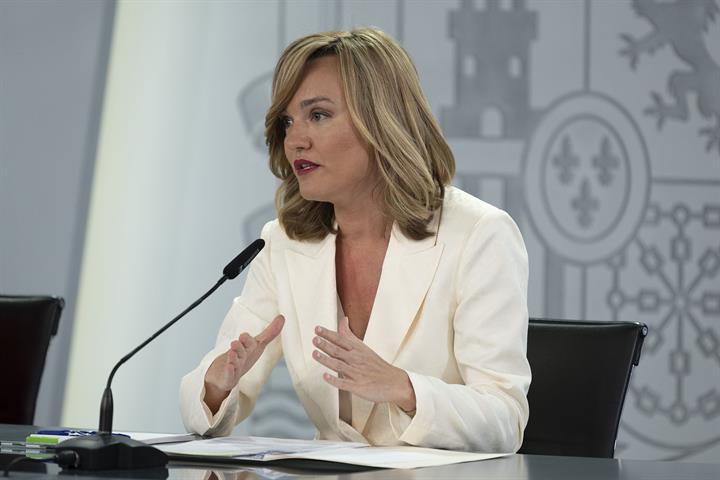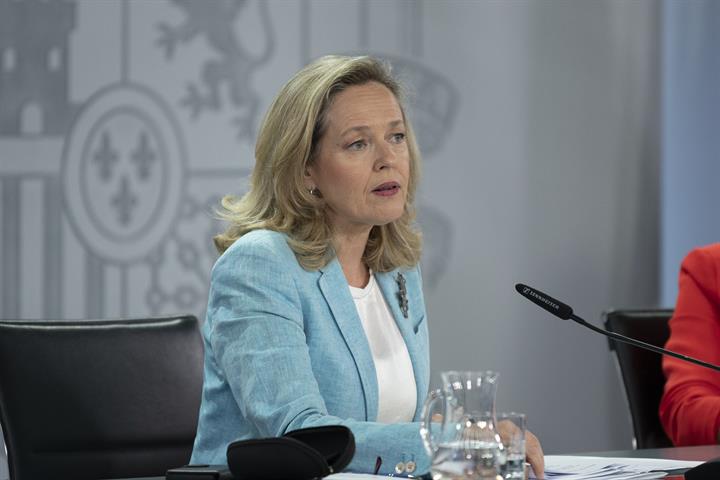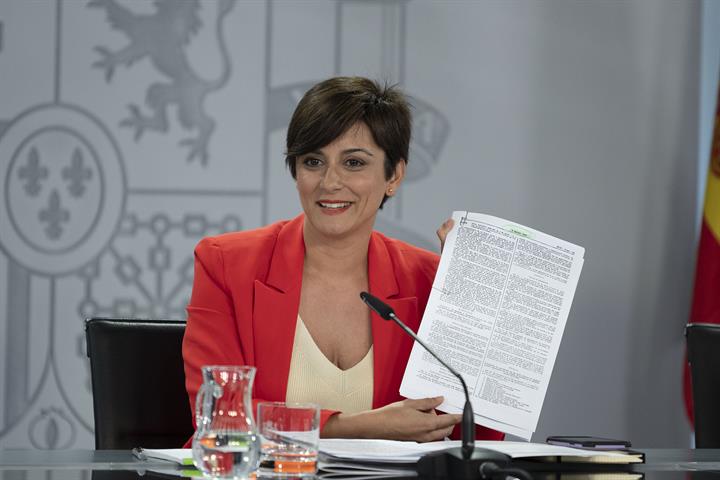Council of Ministers
The Council of Ministers approves new measures to boost vocational training and digital skills
Council of Ministers - 2023.5.3
Moncloa Palace, Madrid
The Council of Ministers has earmarked 1.307 billion euros for the improvement and modernisation of Vocational Education and Training (VET). The Minister for Education and Vocational Training, Pilar Alegría, has framed this decision within the strategic nature of this field, which has made it possible for more than 1.1 million young people to take part in vocational training this year, as she pointed out.
The 1.307 billion euros is distributed in five transfers to the regional governments.
Firstly, 25.7 million will allow new activities to disseminate VET to be implemented, for example through teacher placements in vocational training centres or companies and student mobility programmes, both within and outside Spain.
A second block provides 29.3 million euros for digital training centres. Pilar Alegría explained that there are currently 1,047 centres of this type in operation and that the new investment plans to create another 314, which would be added to the 510 centres run by the local administrations. They will provide basic digital skills training to people at risk of exclusion, with a low level of education or over 55 years of age, among others.
Thirdly, the Government has approved an investment of 273 million euros for several priority actions: the evaluation and accreditation of the skills acquired by more than 540,000 workers throughout their professional careers; the implementation of 304 applied technology classrooms and 444 entrepreneurship classrooms, and the creation of 44,670 new places in bilingual groups.
Re-qualification of workers and the unemployed
 The Minister for Education and Vocational Training, Pilar Alegría, during her speech at the press conference after the Council of Ministers | Pool Moncloa/Borja Puig de la Bellacasa
The Minister for Education and Vocational Training, Pilar Alegría, during her speech at the press conference after the Council of Ministers | Pool Moncloa/Borja Puig de la Bellacasa
A fourth item totals 111.5 million euros for qualification and requalification actions for both workers and the unemployed. The minister detailed that these training activities will benefit some 203,000 people and will be closely linked to the Strategic Projects for Economic Recovery and Transformation (PERTE), to strategic sectors such as robotics or new materials and to the field of care.
Lastly, the Executive has distributed 867.2 million euros from the contributions paid by companies and employees for training actions.
Investing in vocational training, said Pilar Alegría, is "settling a debt with young people", who can thus gain access to "stable, quality and well-paid employment", helping workers to continue training in a permanent and more flexible way and improving the competitiveness of the productive fabric. "To talk about and support vocational training is, in short, to talk about and support the present and the future of our country", she said.
Progress on corporate transparency and corporate social responsibility
The Council of Ministers has decided to open a public hearing on the text of the draft law on improving corporate transparency on environmental, social and governance issues.
The First Vice-President of the Government of Spain and Minister for the Economy and Digital Transformation, Nadia Calviño, explained that the proposed text transposes European regulations to improve the presentation and verification of companies' non-financial information.
Furthermore, the regulation extends the scope of application to all listed companies and financial institutions, excluding micro-companies (assets of under 350,000 euros, turnover of less than 700,000 euros or fewer than 10 employees). Small and medium-sized companies will have a simplified regime according to their capacity and characteristics.
Calviño specified that the information must be submitted in an electronic format and will be verified by an auditor or by an independent verification service provider. Public control of the activity will be carried out through the Accounting and Audit Institute (ICAC), under terms equivalent to those established for the auditing of accounts.
Reinforcement of Acelera Pyme offices
 The First Vice-President of the Government of Spain and Minister for the Economy and Digital Transformation, Nadia Calviño, during her speech at the press conference after the Council of Ministers | Pool Moncloa/Borja Puig de la Bellacasa
The First Vice-President of the Government of Spain and Minister for the Economy and Digital Transformation, Nadia Calviño, during her speech at the press conference after the Council of Ministers | Pool Moncloa/Borja Puig de la Bellacasa
The Government has regulated the direct award of 40 million euros of European 'NextGenerationEU' funds to the Spanish Chamber of Commerce to expand its network of Acelera Pyme offices, which could reach 176 throughout the country, starting this summer.
These offices advise and assist small and medium-sized companies and the self-employed in accessing the European funding support programme of the Digital Kit.
The First Vice-President pointed out that more than 210,000 digitalisation vouchers worth more than 1 billion euros have already been distributed.
Satellite broadband at 35 euros per month
Nadia Calviño has informed the Council of Ministers of the publication of the final decision of the call for applications for UNICO Rural Demand aid, which guarantees access to a broadband connection of at least 100 Mbps at a flat rate of 35 euros per month in areas where there is no access to networks of at least 50 Mpbs.
The programme helps to close the connectivity gap between rural and urban areas, is part of the Digital Spain 2026 agenda and is financed with European 'NextGenerationEU' funds.
Hispasat will be the company in charge of providing this service throughout the national territory from June. It is estimated that more than 1.3 million households and businesses will be able to benefit from it.
Promoting the teaching of Spanish
The Executive has also agreed to a transfer of 2.5 million euros from the European 'NextGenerationEU' funds for the International Spanish Language Centre of the University of Salamanca.
The purpose of this investment, within the framework of the PERTE New Economy of the Language is to seek new markets for the teaching of Spanish and to boost the Spanish language learning industry, according to the First Vice-President.
Economic growth and job creation
During her speech at the press conference following the Council of Ministers, the First Vice-President reviewed the economic data for the first quarter of the year, which, in her opinion, confirms the acceleration of economic growth, job creation and the containment of inflation, aspects reflected in the Stability Programme 2023-2026 and in the National Reform Programme 2023 sent to the European Commission last Friday.
Scientific dissemination and talent attraction
 The Government Spokesperson and Minister for Territorial Policy, Isabel Rodríguez, during her speech at the press conference after the Council of Ministers | Pool Moncloa/Borja Puig de la Bellacasa
The Government Spokesperson and Minister for Territorial Policy, Isabel Rodríguez, during her speech at the press conference after the Council of Ministers | Pool Moncloa/Borja Puig de la Bellacasa
The Government has approved the National Open Science Strategy for 2023-2027, with the aim of guaranteeing public access to all scientific results achieved with public funding. The allocated budget is 23.8 million euros.
The Minister for Territorial Policy and Government Spokesperson, Isabel Rodríguez, stressed the pioneering nature of the initiative and its place in the policies promoted by the European Union. She added that this is a "shift in the paradigm of research activities" which implies that "everything that has been produced with public money in the scientific field must be accessible and open to all in order to continue with this development".
Also in the area of the Ministry of Science and Innovation, the Executive has approved the 2023 call for the ATRAE programme, which has a budget of 25 million euros. According to the spokesperson, the goal is to attract high-level researchers, mainly from other countries, but also Spaniards who have gone abroad. The funds, which can be increased by a further 5 million euros, will cover not only the cost of the researcher, but also all the means necessary for them to carry out their work.
More competitive and quality tourism
The Council of Ministers has authorised the distribution of the third edition of the Tourism Sustainability Plans in Destinations to the Regional Governments, amounting to 478 million euros this time.
The Minister for Territorial Policy has indicated that the three calls for proposals total more than 1.8 billion euros to achieve more competitive and quality tourism, which generates more income and also better working conditions in this area. "It is clear that the tourism sector - which was one of the sectors that suffered most from the pandemic - has recovered" said Isabel Rodríguez.
Strengthening care for dependent persons
Also in the form of direct contributions to the Regional Governments, the Government has earmarked 738 million euros to promote personal autonomy and care for dependent adults. The distribution will be finally approved at the Sectoral Conference.
This call, according to the spokesperson, moves from a welfare model to another with a "much more humanistic, people-centred, community-based and proximity-based" approach, which has been agreed with the regions.
Aid for transport in Ceuta and Melilla
Within the framework of the comprehensive socio-economic development plans for the autonomous cities of Ceuta and Melilla, the Executive has approved new aid for maritime and air transport of goods to and from Ceuta and Melilla.
According to the Minister for Territorial Policy, the aim is to reduce the effective cost of these goods transports, in line with the system in force for the Canary Islands and the Balearic Islands.
Non official translation




